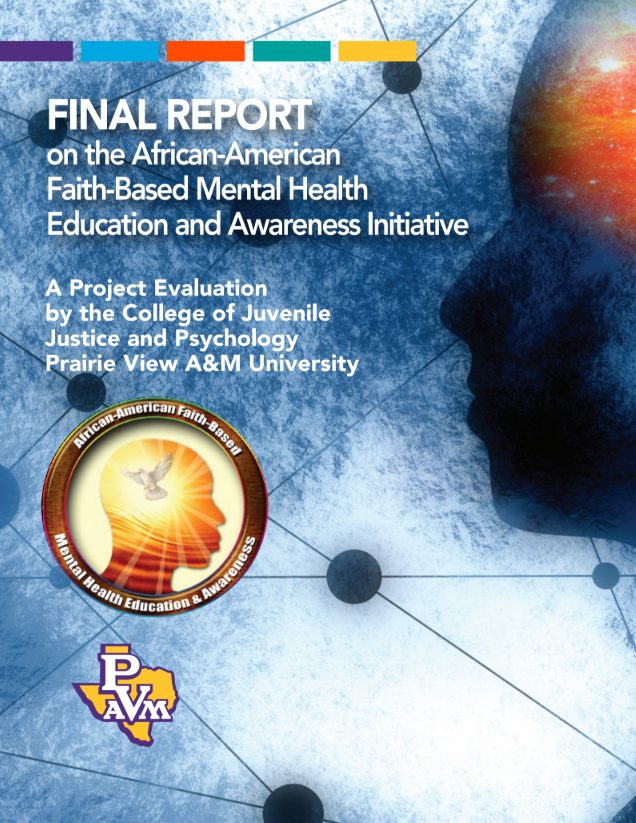African-American Faith-Based Mental Health Education and Awareness Initiative
AAFBMH funding ended August 30, 2018.
In 2014, the Hogg Foundation for Mental Health selected ten (10) African-American faith based organizations in Texas to promote mental health awareness, wellness and recovery over a three-year period. The Hogg Foundation promoted three initiatives under its African-American Faith-Based Mental Health Education and Awareness Initiative (AAFBMH): (1) to educate African American faith communities about mental health, wellness and recovery; (2) to build on the unique strengths of African-American churches as well as other faith and community-based organizations to identify local behavioral, treatment, and support resources; and, (3) to support faith leaders in addressing their own mental wellness. This initiative was evaluated by a team of scholars and students. They were Dr. Tamara Brown (principal investigator), Dr. Pamela Martin (co-principal investigator) and several graduate students assisted with data collection, data management, tables and charts: Leslie Encarnacion, Katina Harris, Ariel McField, Shauna Richards, Richard Rooks, Salim Salim, and Jerron Wray.
WATCH AND LISTEN
View documentary about the initiative
Listen to reflections from grantees
Successes of the Initiative
African-American churches have always provided their communities a variety of resources including social support. Recently, many African-American churches have begun to address mental health as a component of overall positive wellbeing. The African-American Faith Based Mental Health Education and Awareness Initiative engaged ten churches that decided to promote positive mental health messages through education, dialogue and awareness. Several important successes need to be shared with other faith communities, especially congregations interested in implementing faith-based, mental health education and awareness. These successes include:
1. Findings suggest that faith-based programs assist with dismantling inaccurate narratives and/or initial apprehensions which may emerge when addressing the topic of mental health. For example, many grantees focused on dispelling prevalent myths in some African American churches such as “one only needs to take it up with the Lord to fix him/her,” “devil’s ploy to enter your mind and your Spirit” and “you are weak in your faith because of your mental health issue.”
2. Pastoral self-care is an important aspect of pastors’ overall psychological well-being. Pastors participating in this initiative discussed the significance of mental health as one way to avoid stress and burnout within their ministries, i.e. pastors (and their spouses) need to have work-life balance.
3. By incorporating culturally appropriate practices, behaviors, and customs such as health fairs and meal-centered events congregants and other community members generally had indicated a warm and welcoming response in learning about mental illness, recovery and wellness in African American communities.
4. Each grantee accessed local behavioral health resources to identify strategies and implement programming that could meet the mental health needs of African- Americans. Grantees were able to partner with mental health organizations, school districts, colleges, universities, barber shops, other faith communities, and professionals such as healthcare providers, psychologists, etc.
5. Several grantees offered programming across the developmental lifespan. Although the majority of the participants were over forty, several grantees offered programming efforts targeting adolescents and young adults. These programs attempted to inform parents, adolescents, and other adults with significant influence over youth about strategies that help adolescents dealing with emotional distress from social media bullying, for example. Programs targeting post-adolescents, i.e. young adults, emphasized important life transitions such as romantic relationships, employment, and life after college.
6. Grantees learned that unexpected life events such as the July 2016 shooting deaths of police officers at El Centro College in downtown Dallas and Hurricane Harvey can prompt diverse responses to emotional stressors like community-police relations or the occurrence of a natural disaster
Get Final Report on the African-American Faith-Based
Mental Health Education and Awareness Initiative
Sign up to our newsletter

Fact Sheets and Resources
Download Grantees Fact Sheet
Download Pastoral Self-Care Fact Sheet
View AAFBMH Online Resource Library
Inquiries
For initiative inquires: Vicky Coffee, Program Manager
For technical assistance inquires: Sherrye Willis, Founder and President of Alliance for Greater Works™
For evaluation inquires: Pamela Martin, Co-principal investigator